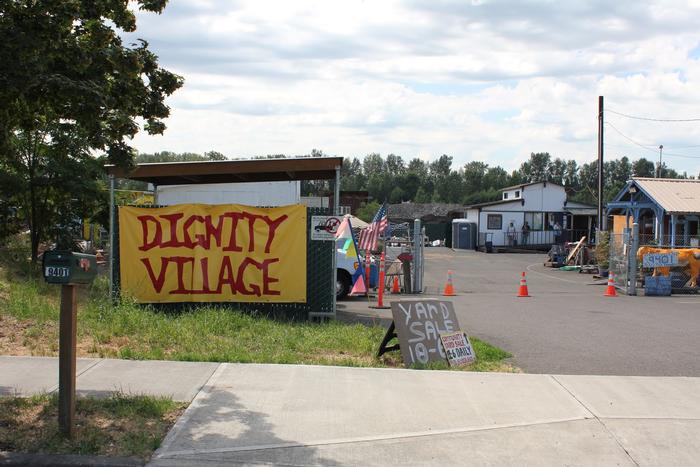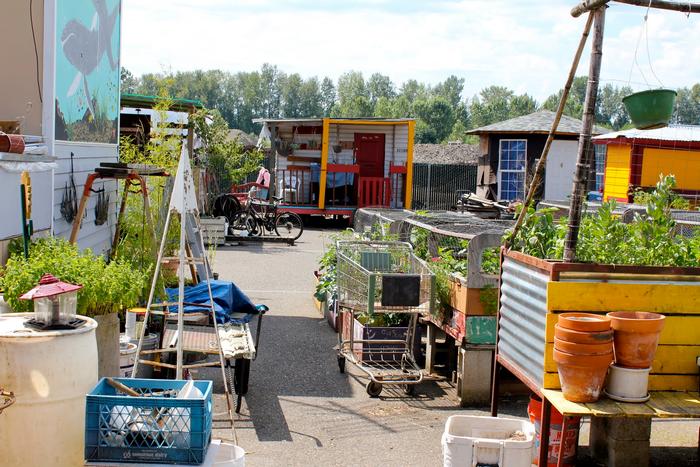Vaihbav Saxena ProposalHomeless in The City of Roses: Journey with JOIN and Dignity VillageEver since I received the “Urban Acupuncture” book by Jaime Lerner from the American professor Stephen Goldsmith, I have been fascinated by urban whimsicality. Lerner writes about how every city faces problems, but somewhere in that city exists small interventions or “pinpricks” of action can bring about change. I can relate my past travels and urban observations in various cities of India to this book. One of the gripping issues which every city in the world is facing is homelessness. Homeless is not a contained problem, it brings up several other problems such as people losing their skills, lower self-esteem and resilience, and the increasing difficulty of finding employment. In my essay I mentioned how I am interested in places which can serve as environments for homeless people to work and live. This proposal will later highlight one of those potential “pinpricks”. As a child and now as an architecture student, I never had the chance to understand how a homeless person might feel living on the streets or what kinds of spaces they need to thrive. There is also a huge difference when one travels as an architecture student and as an architect. The architecture student is carefree and volatile but learns quickly and unconsciously. The architect constantly thinks about a solution on problems like homelessness. It is easier said than done. Therefore, through this proposal I want to travel to Portland, Oregon, USA and use this opportunity to know yet another city to some extent. I am proposing a two-point approach. I have approached two different organisations in the same city and will learn and collaborate with both. My goal is to deepen my understanding as a human being as well as an architecture student of this year’s topic “Architects Confront Homelessness”. I chose to travel to Portland over other cities because it is the best way to understand this years topic. Last December, “a state of emergency was declared by the city council over housing”. JOIN My journey starts by participating in the Immersion program of JOIN, a non-profit organisation started in 1992 by Rob Justus, which places people suffering from homelessness into housing and supports them through their transition with a motto of “connecting the street to home.” In 2009, JOIN started an in-house supportive employment program. In 2014, they helped 560 people find a place to live. In 2015, that number rose to 800. I believe the first step is to understand the condition of homeless people before engaging myself in hands-on construction. The Immersion Program at JOIN will provide me the opportunity to learn about homelessness in Portland by directly talking to people living on the streets. It will give me an insight to their state of mind and their thoughts towards this social injustice. As an architecture student, the 4-day immersion program will help me understand how JOIN helps rebuild communities as well as how it helps people find permanent housing rather than unsustainably building new ones. During my search for various organisations in Portland, I discovered Architects Without Borders (AWB), Oregon whose mission is to help communities in need through design. From 2014, they have worked with JOIN to design a facility called Portland Homeless Storage, where homeless people can store their belongings. They have offered for me to attend their monthly meeting with local professionals and architecture students. This is a great opportunity for me to reflect upon my last four days experience at JOIN. I can gain the perspective of architects and students about the city’s issue of homelessness, and of Portland Homeless Storage. The above combination will set a good platform for me to start my second journey. DIGNITY VILLAGE Dignity Village is a non-profit homeless village. As their facebook page describes, it is the “first homeless village sanctioned by any city government in the world. Ran by homeless people for homeless people." Dignity Village is helping people boost their skills, confidence and abilities. The village empowers people to take control of their lives so they may recover from their financial distress and move on from homelessness. Dignity Village began as a tent city. After it’s controversial beginnings and standoff’s with city officials, the village finally became a sanctioned Tiny House Village by the Portland City Council in 2004. This “pinprick” in the city has become a place for experimentation and change, alleviating the extreme difficulties of homeless living. I have been in contact with Dignity Village’s Building Coordinator Mitch Grubic, and he has described some of his strategies in designing and building sustainable cost-effective homes. The homes have small footprints, use reclaimed materials and are off-grid. The village also employs many permaculture techniques to create a self-sufficient and healthful environment. Mitch has built multiple tiny homes in the village, always testing techniques in sustainability and permaculture. Mitch now plans to build a new tiny home that will be the culmination of all lessons learned from the previous homes. A key design feature of this home is that it’s living space can be easily converted into a work-space. This new prototype will serve as a showcase piece that can be replicated by others. I will collaborate with Mitch and his team to design and build this home over the course of two weeks. Many parts of India suffer greatly from homelessness. I wish to help my country by learning and understanding the extremely unique and successful model of Dignity Village. My ultimate goal is to understand their model so I may explore it further in my university thesis, as well as replicate it in India in my professional career. Through this travel fellowship I would like to immerse myself socially, mentally and physically into the city of Portland on the issue of homelessness and take as much as I can as an architecture student. I always believe that it’s not just the theoretical knowledge or roaming around a city that helps us grasping the issue well enough, it also depends how much experience we have while working with the homeless and for them, understanding the kind of spaces they want. In this proposal my main motive was to achieve both and I have done it through both hands-on and hands-off experience. ITINERARY: 17th June – Arrive in Portland from Ranchi, India 18th June to 21st June – Participate in Immersion Program at JOIN 22nd June – Meeting with AWB, Oregon. 23rd June- 6th July – Volunteering at Dignity Village 7th July – Flight to Ranchi, India from Portland BUDGET : Visa fees – 160 USD Return Air ticket from Ranchi, India to Portland, USA (Air India, United Airlines) – 1630 USD (http://www.goibibo.com/#flight-searchresult/?from=international-flights#air-IXR-PDX-20160616-20160707-1-0-0-E ) Fee to participate in the 4-day Immersion Program at JOIN – 60 USD per day i.e. 240 USD Accommodation and Food for 20 days – 60 USD per day i.e. 1200 USD (http://www.portlandhostel.org/rates-reservations/) No fee for volunteering at Dignity Village and participation in the general meeting of AWB - Oregon. Total Expenditure – 3230 USD REFERENCES AND CONTACTS: Immersion Program at JOIN: http://joinpdx.org/programs/ , http://joinpdx.org/wp-content/uploads/2014/06/Immersion-Info.pdf One day meeting with AWB-Oregon: http://www.awboregon.org/current-projects/2015/01/portland-homeless-storage-facility Contact Person: Catherine Paglin, cpaglin@gmail.com Volunteering at Dignity Village: Contact Person: Mitch Grubic, bajasur63@gmail.com I would like to take this opportunity to thank each of the persons mentioned above and my professor Janmejoy Gupta for helping me in this proposal. Being a travel photographer, I would like to document my whole journey from India to Portland and back to India, which will include but not limited to photographs, recordings of interviews and discussions. Also I would like to thank the jury for giving me this opportunity to write the travel fellowship proposal. NOTE: All the information above have been written only after confirmation.
Additional Help and InformationAre you in need of assistance? Please email info@berkeleyprize.org. |
|


